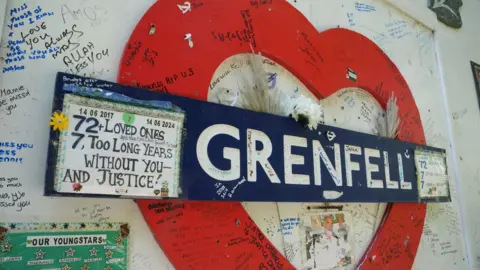 PA
PAPublic inquiries into disasters such as the Grenfell Tower fire take too long and often do not lead to change, a Lords report has found.
Inquiries are routinely set up by governments to “learn lessons” and avoid future tragedies.
But Lord Norton, who led the report, said: “Lessons learned’ is an entirely vacuous phrase if lessons aren’t being learned because inquiry recommendations are ignored or delayed.
“Furthermore, it is insulting and upsetting for victims, survivors and their families who frequently hope that, from their unimaginable grief, something positive might prevail.”
The report sets out ways to make inquiries more effective. The government said it would study the recommendations.
In recent years there have been large-scale inquiries launched into subjects including Grenfell, the infected blood scandal and the Covid pandemic.
However, earlier this year bereaved families expressed their fears that the recommendations from these inquiries would “simply disappear”.
Some campaigners said they have “no faith” that the reports would lead to change.
A report by the House of Lords Statutory Inquiries Committee has now called for a rethink in how inquiries are carried out and crucially, how their recommendations, are implemented.
The committee warned that inquiries were perceived as “frequently too long and expensive, leading to a loss of public confidence and protracted trauma”.
“Currently, millions of pounds are spent on public inquiries yet too little is done to ensure that the desired outcomes are achieved.”
A government spokesperson said: “We remain absolutely committed to righting past wrongs and working to ensure justice is delivered for victims.
“We thank the committee for its report and will take the time to consider its findings and recommendations.”
In the course of taking evidence, the Lords committee was told that some patient deaths at Mid-Staffordshire Hospital could have been avoided if recommendations from an inquiry into Bristol Royal Infirmary had been implemented.
Similarly, the committee heard that recommendations made following the Lakanal House fire could have prevented the fire at Grenfell Tower.
Conversely, witnesses told the committee that a report on the Soham murders led to better child protection rules, while an inquiry after the Dunblane shootings strengthened gun ownership laws.
The Grenfell inquiry, which took seven years, made 58 recommendations.
Prime Minister Sir Keir Starmer has said the government will look at them in detail and respond within six months.
The Lords committee said there was a perception that inquiries were established by ministers to “kick a problem into the long grass”.
One of their key proposals is for Parliament to establish a new committee which would “hold the government to account” for implementing recommendations.
Lord Norton said such a body could create a “deterrent effect” and “stop minister from not paying enough attention”.
He says inquiries could also be speeded up if they are placed on a non-statutory rather than statutory footing.
Statutory inquires have the power to compel people to give evidence and to give it in public and under oath.
In 2018, the Institute for Government think tank found that between 1990 and 2017, 69 inquiries had been launched, taking an average of around two years to report and costing a total of at least £630m.
One of the most expensive was the Bloody Sunday inquiry which lasted 12 years and cost £210.6m.
Lord Norton’s report argues that often inquiries try to “investigate too widely” instead of “focusing on the key purpose of learning lessons”.
It says ministers should “resist the temptation to charge an inquiry with the responsibility of investigating wider policy areas”.
It also advises setting deadlines to “concentrate the efforts of the inquiry chair”.
The government argues that, by law, the process, timing and procedure of inquiries are decisions for their independent chairs.

